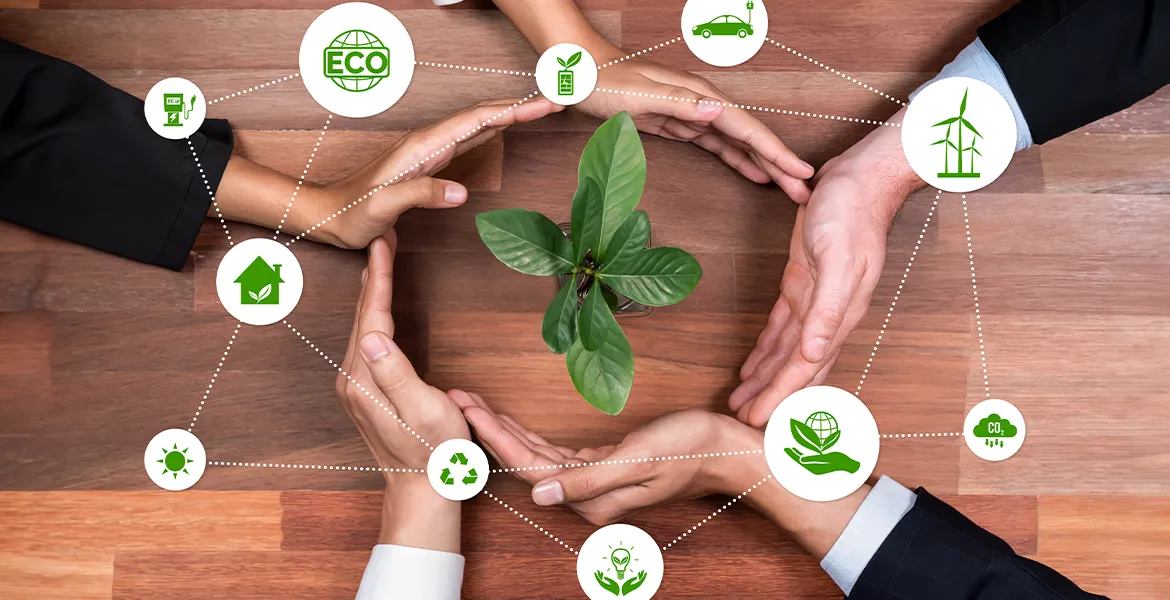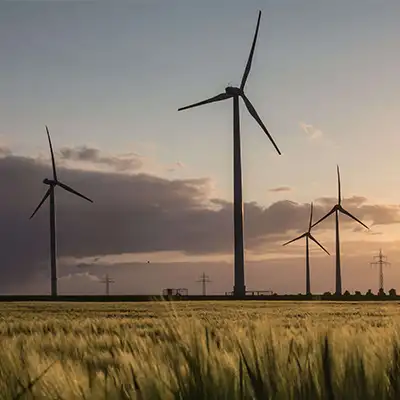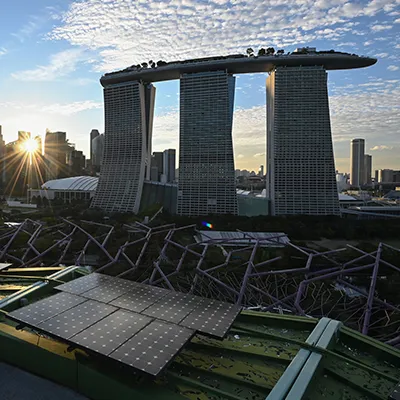Singapore is pushing towards our net-zero goals with several carbon services and renewable energy initiatives. From developing high-quality carbon credits to increasing solar energy capacity and grid resilience, here’s a recap of significant developments in Singapore’s sustainability landscape in Q2 2024.
1. Singapore continues expanding access to cleaner energy sources
Singapore plans to build two more hydrogen-ready natural gas power plants by 2030, to power approximately 864,000 four-room flats annually. The Energy Market Authority (EMA) has called for proposals for two more hydrogen-compatible natural gas power plants, each with a capacity of at least 600 MW. When completed, this will bring the total number of hydrogen-compatible plants in Singapore to nine, producing over 3.7 gigawatts (GW) of power. This follows recent announcements of similar projects, including YTL PowerSeraya’s S$800 million power plant by 2027 and the Keppel Sakra Cogen Plant by 2026.
Sembcorp, Meranti Power, and PacificLight Power are also developing five plants, with four expected by 2025 to provide rapid-response electricity during supply shortfalls. Singapore's peak electricity demand is projected to grow by at least 3.7% by 2030, reaching between 10.1 GW and 11.8 GW by 2030.
An environmental study has found minimal biodiversity impact if Singapore’s largest floating solar farm is constructed at Kranji Reservoir. This project will significantly boost Singapore’s renewable energy efforts. When operational sometime between 2027 and 2028, the solar farm will produce 141 MW-peak of clean energy, contributing around 7 per cent to the 2 GW-peak solar capacity target by 2030. This solar farm project, together with planned solar farms at Lower Seletar and Pandan Reservoirs, will support Singapore’s goal for solar to meet about 10 per cent of projected energy demand by 2050.
Singapore’s energy regulator, the Energy Market Authority, is looking to improve grid resilience and reliability as more renewable energy sources are introduced to the energy mix. For example, as Singapore moves to increase solar energy’s contribution to its energy mix, it has to take into account that solar panels cannot produce electricity continuously, which means peak demand mismatches can cause grid instability. To address this, EMA is adding a solar photovoltaic forecasting model to better predict solar output and manage intermittency. Two energy storage systems, with a total capacity of 285 MWh, are already connected to the grid to support the 2GW-peak target. EMA's enhancements will enable prompt management of supply-demand changes, as demand grows from electricity-intensive sectors like advanced manufacturing and the digital economy. The new energy management system also features intelligent alarm processing to improve operator response during power disruptions, minimising downtime and enhancing overall system reliability.
2. ERM expands Singapore hub to accelerate growth in the region
ERM, the world's largest specialist sustainability consultancy, is expanding its Southeast Asia hub in Singapore to enhance its sustainability efforts across Asia. The expansion will enable ERM to better serve regional clients by leveraging its experience in decarbonisation projects, such as transitioning manufacturing to renewable power and replacing fossil fuel generators with renewable energy sources.
3. Indo-Pacific partners ink clean economy deal with programme on nuclear energy
The Indo-Pacific Economic Framework for Prosperity (IPEF), comprising 14 countries, signed a clean economy agreement, introducing three new work programmes, including one on small modular reactors (SMRs). This agreement, one of eight work programs under the clean economy pillar, promotes long-term cooperation on climate solutions. The other two new programmes focus on emissions intensity accounting and sustainable e-waste management.
A coalition of investors, including Singapore’s Temasek and GIC, committed US$25 billion (S$33.6 billion) to infrastructure investments in emerging markets within IPEF. This follows the identification of 20 investment-ready projects, worth US$6 billion, focusing on sustainable infrastructure in areas like industrial parks, energy, and water transport. The projects were presented at an investor conference organised by IPEF.
4. Singapore, Ghana sign carbon credit agreement enabling firms to offset part of carbon tax
Companies in Singapore will soon have the option to purchase carbon credits from projects in Ghana, which they can use to offset part of their carbon tax liability. Under the agreement, carbon credit project developers in Ghana must contribute 5 per cent of proceeds to climate adaptation efforts in Ghana and cancel two per cent of credits to aid global emissions reduction. Singapore’s International Carbon Credit Framework allows companies to offset up to five per cent of their taxable emissions by investing in carbon credit projects that meet Singapore's eligibility criteria. This agreement follows a similar one signed with Papua New Guinea in December 2023. Singapore is also in the process of negotiating similar carbon credit schemes with Vietnam, Paraguay, and Bhutan.
5. An ‘attractive place’ to develop new climate tech
Microsoft co-founder Bill Gates spoke to Singapore broadcaster Channel NewsAsia about how Singapore can play a role in incubating climate technologies. The founder of climate investment firm Breakthrough Energy has partnered with government agency Enterprise Singapore and state investment firm Temasek to identify and grow budding climate technology in Southeast Asia. Gates said innovation was crucial to move the world towards cleaner sources of energy and Asia was a strong source of scientific capabilities. “Singapore has very strong universities. It’s a very attractive place if you’re coming from multiple parts of Asia, to build the team.”
Watch the video.
Separately, read what the CEO of VC firm Investible, Rod Bristow, has to say about Singapore’s ClimateTech ambitions. The country has lots going for it but there are several challenges it will need to get right, such as getting the right talent.
6. New registry for Singapore businesses to track and report carbon emissions launched
Singapore has launched a registry to help Singapore-based businesses track and report their emissions more easily and accurately. The Singapore Emission Factors Registry contains a database of emission factors developed based on Singapore’s business activities and converts these operational data into corresponding greenhouse gas emissions. This initiative comes ahead of Singapore’s climate-related disclosure requirements for listed companies from FY2025. It is a joint effort between the Singapore Business Federation, Agency for Science, Technology and Research, PricewaterhouseCoopers, and Singtel, and is supported by the Ministry of Trade and Industry and Ministry of Sustainability and the Environment, and emerged following feedback on the challenges companies face in reporting scope 3 emissions.
7. Singapore to expand data centre capacity by more than one-third, pushes for green energy use
Singapore announced plans to expand its data centre capacity by at least one-third in response to the growing demand for computing power as businesses digitalise and AI services increase. The expansion will include adding at least 300 MW of capacity, with an additional 200 MW allocated for operators using green energy options, reflecting an effort to balance between increased digitalisation and Singapore’s environmental goals. This potential increase of 500 MW will supplement the existing 1.4 GW of capacity in over 70 data centres in Singapore. There are also plans to provide grants and award licenses to operators that use green energy and meet stringent standards. These operators can access schemes from EDB and other agencies, potentially reducing operating costs by around 30 per cent or more. The roadmap outlines green standards to improve energy efficiency, such as upgrading equipment and using liquid cooling solutions, including immersion cooling for optimal energy efficiency.
In case you missed it, here’s what we published in the second quarter of 2024:
High-quality carbon credits are one of the biggest impediments to functioning carbon markets today. Two organisations based in Singapore are using science-based research to develop high-impact tools to actualise the vast potential of nature-based solutions available in Southeast Asia’s rich natural ecosystems. Find out what they’ve achieved so far and how Singapore supports their efforts in the region.
Why Singapore is the location of choice for global carbon markets
Carbon credits are an innovative financing mechanism that allows corporations to support emission-reducing projects. However, the world is grappling with the reliability and quality of carbon credits. Singapore is actively contributing to global efforts to instill trust in carbon credits, such as by advancing scientific research in nature-based solutions, increasing transparency in carbon markets through Singapore’s Climate Action Data Trust, and collaborating with prominent carbon crediting programs such as Gold Standard and Verra’s Verified Carbon Standard. Over 100 carbon market services players have established their Southeast Asian home bases in Singapore, leaving room for further innovation and collaboration in the future.
Learn about how Singapore is partnering with businesses to accelerate their low-carbon transition and seize new opportunities in the green economy.
Follow us on LinkedIn to get more updates or subscribe to our newsletter.







